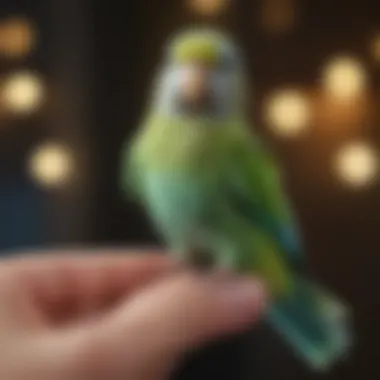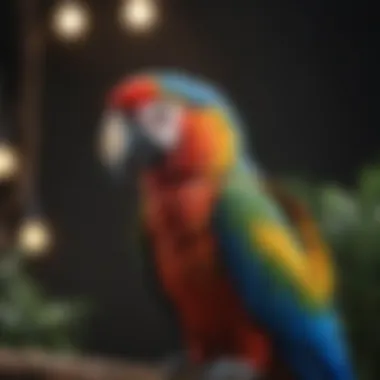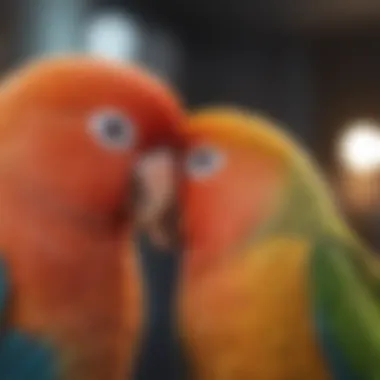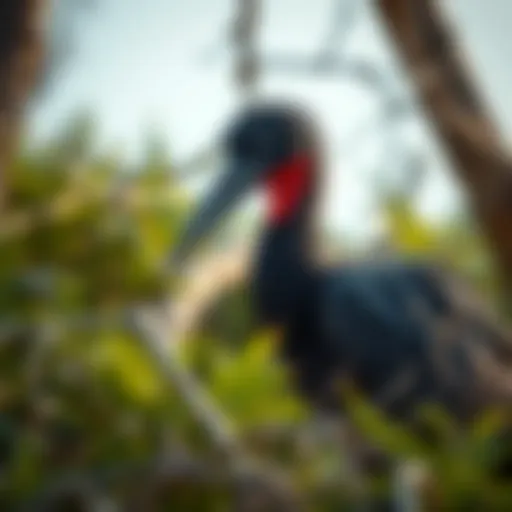Choosing the Right Pet Birds: An In-Depth Exploration


Intro
Choosing a pet bird can be complex yet rewarding. Understanding the characteristics and needs of different species is essential. This article simplifies the selection process by examining various bird breeds and their compatibility with potential owners. Each bird species has its own unique requirements and personality traits. Assessing these factors can lead to a more harmonious relationship between the bird and owner. This exploration aims to equip readers—whether they are first-time bird parents or experienced enthusiasts—with the knowledge necessary to foster a fulfilling avian companionship.
Avian Care Basics
Caring for a pet bird goes beyond simply providing food and water. Attention to various aspects of their life is crucial for their overall well-being. Here are some key areas to focus on:
Importance of Proper Nutrition
A balanced diet is vital. Pet birds need a mix of seeds, fruits, vegetables, and specially formulated pellets. Each species has specific dietary requirements. For instance, larger birds like African Grey parrots often need more protein and variety than smaller birds such as finches. A well-rounded diet boosts their health and longevity.
Understanding Bird Species and Their Needs
Not all birds are the same. Some thrive on social interaction, while others prefer solitude. Popular species such as Budgerigars, Cockatiels, and Lovebirds offer different levels of companionship and care needs.
- Budgerigar: Friendly and easy to care for; social and requires interaction.
- Cockatiel: Known for their playful nature; demands attention and socializing.
- Lovebird: Affectionate yet can be aggressive if not socialized properly.
Evaluating the lifestyles of potential owners will also help. Busy individuals might find more independent species easier to care for.
Basics of Bird Habitat Setup
Creating a proper habitat is imperative. The cage should be spacious enough for movement and play. It is essential to include appropriate perches, toys, and feeding stations. Regular cleaning of the habitat helps maintain a healthy environment which prevents illnesses.
Grooming and Hygiene Tips
Birds need regular grooming to stay healthy. This includes:
- Nail trimming: Overgrown nails can lead to injuries.
- Feather care: Regular baths encourage healthy plumage.
- Cleaning: Regular sanitation of their environment prevents various diseases.
Interacting with Your Pet Bird
Bonding with a pet bird requires understanding and patience. Interaction promotes trust and mental stimulation.
Building Trust and Connection
Birds are sensitive creatures. Begin interactions slowly, allowing the bird to become familiar with the owner’s voice and presence. This process may take time, but establishing trust is vital for long-term companionship.
Training Techniques and Tips
Training enhances communication and behavior. Start with simple commands. Use positive reinforcement, such as treats or praise, when the bird responds correctly. Training not only sharpens their skills but also strengthens the bond.
Fun Activities for Bird Owners and Their Birds
Engaging in activities together fosters deeper connections. Simple games like hide-and-seek or teaching tricks can provide mental stimulation. Birds also enjoy gentle out-of-cage playtime to explore their surroundings safely.
Recognizing Bird Cues and Behaviors
Understanding bird behaviors is essential. Changes in chirping, posture, or eating habits can indicate their mood or health. Being attentive will help address any concerns early.
Emotional Well-Being of Birds
Birds require emotional stimulation as humans do. Ensuring a healthy emotional environment is as important as physical care.
The Role of Play and Socialization
Interactive play boosts mood and overall well-being. Birds are social animals that thrive on interaction with their owners and other birds. Providing companionship can prevent loneliness and associated stress.
Enhancing Birds' Emotional Health
Incorporate varied activities that stimulate both their mental and physical faculties. Parrots, for instance, enjoy puzzle toys. Rotate toys regularly to maintain interest.
Assessing Bird Stress and Remedies
Recognizing signs of stress is critical. Common indicators include excessive vocalization, feather plucking, and aggression. If stress is noted, assess their environment and interactions. Some may benefit from soothing music or quiet time.
Building Strong Human-Bird Bonds
Continuous engagement creates strong bonds. Each session of interaction contributes to a deeper understanding of the bird's personality.
Bird Health and Safety
Ensuring the health and safety of pet birds is pivotal. Regular veterinary check-ups should not be overlooked. Preventative measures can lead to significant health improvements.
Common Health Issues and Prevention
Common issues include respiratory infections and obesity. Providing a balanced diet alongside a clean habitat often prevents these. Watch out for changes in behavior or appetite; they may signify underlying health problems.


Routine Veterinary Care
Annual veterinary visits help identify health problems early. Consult with a vet who specializes in avian species for tailored care suited to specific birds.
Environmental Hazards to Avoid
Certain household items pose dangers to birds. Avoid exposure to toxic plants, fumes from non-stick cookware, and overly cold drafts. A safe environment is crucial for their well-being.
Signs of Illness or Distress
Look for visible signs such as ruffled feathers, lethargy, or changes in droppings. These indicators should prompt a veterinary consultation to prevent serious issues.
Fun Facts and Quirky Insights
Delving into the world of birds can unveil intriguing facts.
Unique Traits of Popular Bird Species
Every species has its charm. For example, the African Grey Parrot is renowned for its intelligence and ability to mimic human speech.
Historical and Cultural Significance of Birds
Birds have been part of human culture for centuries. Their symbolism varies across cultures, from messengers of the divine to symbols of freedom.
Famous Bird Owners and Their Stories
Many notable figures, including artists and scientists, have been bird owners. Their stories reflect the deep connections formed over time and how these relationships enriched their lives.
Through a careful consideration of avian needs and owner compatibility, choosing the right pet bird can be a fulfilling journey. The bond developed with a pet bird can lead to enriching experiences and lifelong companionship.
Prelims to Pet Birds
Pet birds are unique companions that offer various benefits to those who choose to welcome them into their homes. Understanding the nuances of pet bird ownership commits individuals to a fulfilling journey that involves not only companionship but also responsibility. This section analyzes the significance of pet birds in the lives of their owners while laying the groundwork for what follows in this comprehensive guide.
Overview of Pet Bird Ownership
Owning a pet bird can be a rewarding experience. Birds exhibit distinct personalities, social behaviors, and often form strong bonds with their owners. Pet birds can be small companions, such as budgerigars, or larger, more complex species like African Grey parrots. Each type comes with its own set of needs and requirements. Therefore, before choosing a bird, potential owners should consider their lifestyle and capacity for care.
Here are key aspects related to pet bird ownership:
- Emotional Connection: Birds can be affectionate and develop deep connections with their human companions, enhancing emotional well-being.
- Social Interaction: Many pet birds are inherently social creatures and thrive on regular interaction with their owners.
- Educational Value: Birds can be intelligent and require mental stimulation, encouraging owners to engage in training and problem-solving activities.
This deeper understanding of pet birds will prepare prospective owners for the responsibilities involved, allowing them to establish a nurturing environment.
Importance of Choosing the Right Species
Selecting the right bird species is paramount for a successful ownership experience. Each species exhibits different behavioral traits, care needs, and social requirements. Understanding these differences is crucial.
- Compatibility with Lifestyle: Not every species of bird is suited for every type of owner. For example, a lively cockatiel may require more interaction than a solitary finch. Taking personal lifestyle factors into account before making a choice is necessary.
- Care Requirements: Each species has specific health and dietary needs. This knowledge helps owners provide the best care and avoid potential health issues.
- Social Dynamics: Birds are social animals and often benefit from the company of their kind. Considering this aspect will lead to happier birds and owners alike, ensuring that interactions are positive.
"Choosing the right species means understanding both the birds’ needs and your own capabilities."
Ultimately, the importance of selecting the right species cannot be overstated. It directly impacts not only the health and happiness of the bird but also the satisfaction of the owner. Taking the time to reflect on these decisions can lead to an enriching and sustainable pet relationship.
Factors to Consider When Choosing a Pet Bird
Choosing a pet bird is a significant decision. This process requires thoughtful consideration of various elements. Birds can be delightful companions, but their needs often differ from a more traditional pet. Hence, understanding these factors is crucial.
When selecting a bird, owners must think about elements like space requirements, time commitment, interaction levels, noise tolerance, and health concerns. These considerations shape not only the well-being of the bird but the satisfaction of the owner. The right choice can lead to a harmonious relationship, while the wrong choice could result in frustration for both parties. Therefore, this section provides insights into these critical factors, ensuring better-informed decisions.
Space Requirements
Space is fundamental when considering a pet bird. Different species have varying space needs depending on their size and behavior. For instance, larger birds like the African Grey Parrot require spacious cages and ample areas to fly. In contrast, smaller birds such as budgerigars can thrive in smaller environments but still benefit from space to stretch their wings.
Owners should measure available areas in their homes, factoring in not just the cage but also the bird's need for flight and exercise. A recommended ideal is to ensure the bird has enough space outside of its cage to engage in natural behaviors. If limited space is an issue, some species may still fit well, but it's important to remember their need for mental stimulation and movement.
Time Commitment
Bird care demands time and attention, making it another critical consideration. Many birds need daily interaction and socialization. This means that prospective owners should evaluate their daily schedules. Some species, like cockatiels, thrive on interaction, requiring several hours a day of engagement.
Moreover, time should include daily feeding, cleaning, and ensuring mental stimulation through toys and activities. It is essential to strike a balance between work, personal life, and the time dedicated to a pet bird. Not dedicating enough time can lead to behavioral issues in birds, such as boredom or anxiety.
Level of Interaction Desired
Birds are social creatures. Therefore, the desired level of interaction is a key factor. Some species, like lovebirds, flourish in social settings and love engaging with their owners. In contrast, others might choose to keep to themselves or can be more independent.
Potential owners should consider how much interaction they want from their pet bird. If looking for a cuddly companion, a species known for affection is preferable. However, if wanting an observer or a low-maintenance friend, a more solitary species may be a suitable option. Understanding this dynamic ensures a fulfilling relationship between the bird and its owner.


Noise Levels and Tolerance
Noise can be a considerable factor when selecting a pet bird. Certain species are known for their vocal abilities, while others are relatively quiet. For example, canaries are famous for their songs, while some cockatiels can be quite vocal. This potential for noise can be an issue in smaller living spaces or for people sensitive to sound.
As such, it's vital for prospective owners to assess their own tolerance to noise. Checking local regulations regarding pet noise may also be prudent. Different species exhibit behaviors that may amplify their vocalizations during specific times. Therefore, finding a bird with compatible noise levels with one’s living situation is important.
Allergies and Health Concerns
Lastly, allergies and health concerns must not be overlooked. Some individuals may be allergic to specific bird species or the dander they produce. Health considerations apply not only to the bird but also to the owners. Ensuring that a potential species does not trigger allergies is paramount.
Furthermore, owners need to monitor the bird's health with regular veterinary check-ups. Understanding potential health issues related to specific breeds can help new bird owners make informed choices.
In summary, choosing the right pet bird entails careful consideration of various factors that influence both the bird's well-being and the owner’s satisfaction. Understanding space, time, interaction, noise tolerance, and health concerns can lead to a rewarding pet-owning experience.
Popular Species of Pet Birds
Choosing the right species of pet birds is central to ensuring an enriching experience for both the owner and the bird. Each type of bird has its unique characteristics, care requirements, and social needs, which can greatly influence their compatibility with potential owners. Therefore, getting familiar with popular species helps in making informed decisions. A careful selection can lead to fulfilling companionship while minimizing potential issues that may arise from mismatched expectations.
Budgerigar (Budgie)
Characteristics and Personality
Budgerigars, often known as Budgies, are renowned for their friendly and sociable nature. These birds are typically easygoing and adaptable, making them a favorable choice for first-time bird owners. Their playful demeanor often leads them to form strong attachments with their owners. Budgies are also known for their lively chatter and mimicry, which adds another layer of engagement. However, they require regular interaction to thrive, which might not suit everyone.
Care Requirements
When selecting a budgie, understanding care requirements is crucial. These birds need a spacious cage, a varied diet, and regular mental and physical stimulation. A well-balanced diet enhances their overall health and longevity. Owners should be aware that inadequate care can lead to health issues like obesity or feather plucking. Accessibility to high-quality products makes caring for budgies easier and more efficient.
Social Needs
Socialization is vital for budgies. They are flock animals and thrive in social environments. Having another budgie can fulfill their need for companionship and prevent loneliness. Regular playtime out of the cage can strengthen their bond with their owner and allow them to express their natural behaviors. Neglecting their social needs can lead to stress and behavioral problems.
Cockatiel
Distinctive Traits
Cockatiels are recognizable by their crest and bushy tail feathers. Their playful nature complemented by a high level of intelligence makes them engaging pets. They often develop strong bonds with their owners and exhibit affectionate behaviors. As entertaining as they are, they also require mental stimulation to avoid boredom, which could lead to undesirable behaviors. Understanding their traits helps in creating a proper environment for their development.
Training Potential
Cockatiels respond well to training, thanks to their keen cognitive abilities. They can learn to mimic sounds and even phrases. This not only enhances interaction but also keeps them engaged. Training requires time and patience but is rewarding in terms of behavior management. However, when training is neglected, cockatiels may develop undesirable habits influenced by a lack of structure in their daily routine.
Health Considerations
Health considerations for cockatiels include maintaining a proper diet, regular veterinary check-ups, and providing a clean living environment. Common health issues include respiratory problems and nutritional deficiencies, which can arise from improper care. Understanding these health considerations enables owners to provide suitable environments that promote overall wellbeing.
Lovebirds
Behavioral Traits
Lovebirds are known for their strong pair bonds and affectionate nature. They are energetic and lively, requiring ample interaction and stimulation. Their playful behavior can be entertaining, but they may also exhibit jealousy if not sufficiently socialized. Acknowledging these behaviors is key to nurturing a healthy environment.
Companionship Needs
These birds thrive on companionship. They do best in pairs and require significant interaction with their owners or other lovebirds. Not meeting their companionship needs can lead to stress and feather plucking. Hence, potential owners should consider their lifestyle and availability when thinking about lovebirds as pets.
Environment Setup
The environment setup for lovebirds should include a spacious cage with plenty of toys to encourage play and exploration. A varied diet including fresh fruits and vegetables is vital. The habitat should also allow for social interaction, with opportunities to fly safely outside the cage. A well-thought-out environment setup positively impacts their overall happiness and health.
African Grey Parrot
Cognitive Abilities
The African Grey Parrot is celebrated for its exceptional intelligence. They can solve puzzles, understand concepts, and even use words in context. This makes them one of the most engaging pet birds available. However, their high intelligence requires adequate mental stimulation through toys and interacting with their owner. An understimulation can lead to problems like self-mutilation and excessive noise.
Vocalization Skills
Known for their remarkable vocalization skills, African Greys can mimic human speech and other sounds effectively. This capability makes them popular among bird enthusiasts. However, their ability to make noise can be a downside for noise-sensitive owners. A balance must be struck between allowing them to vocalize and managing noise levels in the household.
Long-Term Commitment
Owning an African Grey Parrot is a long-term commitment as they can live for over 50 years. Potential owners must consider their availability and readiness for this responsibility. These birds not only require daily interaction but also a structured environment to promote mental and physical health. A long-term commitment involves planning for lifestyle changes and other factors that may arise over time.
Canaries and Finches
Song and Color Variations


Canaries and finches are appreciated for their beautiful songs and color variations. Canaries, in particular, are known as songbirds, and many species showcase unique melodies. Potential owners should explore the different species to find one that aligns with their preferences. The aesthetic and auditory contributions of canaries and finches can enhance the living environment, making them a popular choice for many.
Group Living
Both canaries and finches thrive in social settings. They enjoy the company of their kind, which is essential for their emotional welfare. Group living encourages natural behaviors and reduces stress. Prospective owners should consider compatibility among species and provide adequate space for a harmonious environment.
Care Needs
The care needs of canaries and finches primarily revolve around providing a clean habitat, appropriate diet, and social interaction. They require a specific diet rich in seeds, fruits, and vegetables to maintain their health. Understanding and meeting these care needs ensure that these birds lead happy and healthy lives in their homes.
Understanding Bird Behavior
Bird behavior is crucial for anyone interested in pet birds. Understanding the dynamics of bird behavior can significantly enhance the relationship between the owner and their avian companion. Birds are social creatures and their behaviors are indicative of their emotional state. An owner who understands these nuances can facilitate a healthy, nurturing environment for their pet.
Social Interactions
Social interactions among birds are fundamental to their well-being. Pet birds are not just pets; they thrive on socialization, whether with human companions or other birds. In households with multiple birds, interactions can vary greatly by species. For example, lovebirds form strong bonds with their partners, while African Grey Parrots may require more varied social interactions for emotional stability.
When engaging with your bird, observe its body language. Signs of happiness may include fluffed feathers or playful chirping, whereas signs of stress can manifest through aggressive posturing or rapid wing flapping. Always aim to create a safe space where your bird feels comfortable expressing itself.
Stress and Comfort Signals
Being aware of stress and comfort signals in birds is a vital part of responsible ownership. Birds, like all animals, exhibit specific behaviors when they are stressed or content. Understanding these behaviors can prevent potential health issues.
Some common stress signals include:
- Feather plucking: This could indicate anxiety or boredom.
- Hiding: A stressed bird might retreat to a corner or a covered area.
- Aggressive behavior: This often happens when a bird feels threatened.
In contrast, birds display comfort through vocalizations and relaxed posture. A bird that sings and shows a playful demeanor is likely at ease within its environment. Owners should strive to identify and respond to these signals in a timely manner, adjusting environmental factors when necessary to reduce stress.
Play and Enrichment Activities
Engaging your bird in play and enrichment activities is essential for its mental and emotional health. Birds need stimulation to prevent boredom and develop their physical abilities. Enrichment can take many forms, including toys, foraging activities, and interaction with humans.
Toys that encourage problem-solving, like puzzle feeders, can be particularly beneficial. Different species may have distinct preferences; for instance, cockatiels may enjoy bell toys, while budgies can be entertained by swings and mirrors.
Regular playtime not only provides physical engagement but also strengthens the bond between the owner and the bird. Allocate 30 minutes each day for dedicated play, allowing your pet to explore and learn in a safe environment.
"Understanding bird behavior is not just about observation; it is about building a relationship based on trust and awareness."
In summary, fostering a deep understanding of bird behavior will enhance the quality of life for both the pet and the owner. This comprehension is the cornerstone of effective care, facilitating a rewarding avian companionship.
Building an Emotional Bond with Your Bird
Building a secure and loving bond with your pet bird is important for both the owner and the bird. Emotional connections foster mutual trust and allow for better interactions. When the emotional bond is strong, the bird is more likely to communicate and interact positively with its environment. This section will delve into key aspects of forming this bond, recognizing benefits, and understanding essential considerations.
Understanding Communication
Effective communication lays the groundwork for a solid bond between you and your bird. Birds communicate using body language, vocalizations, and behaviors. To understand your pet better, observe its posture, feather positioning, and movements. For instance, if your bird is puffed-up or has its feathers fluffed out, it may be anxious or uncomfortable. Conversely, a relaxed posture often indicates a comfortable and trusting bird.
Vocalizations can also offer insight into how your bird is feeling. While some species are known for their mimicry, others express themselves through chirps and whistles. Listening to different sounds that your bird makes can help you pinpoint its mood, so be attentive.
Participating in these communications enhances mutual respect. Use a calm and soothing tone when speaking to your bird. Over time, your bird will learn to associate your voice with comfort, resulting in an overall increase in trust.
Bonding Techniques
Applying specific techniques can nurture the emotional connection between you and your bird.
- Consistent Interaction: Daily interactions help in creating a routine. Whether it is gentle talking, petting, or simply sitting next to its cage, consistency is key. Birds thrive on routine, which develops their sense of security.
- Positive Reinforcement: Reward your bird for desired behaviors. This can be through treats, praise, and gentle strokes. Acknowledging good behavior reinforces trust and mutual affection.
- Playtime: Engaging in play is crucial. Toys can be a bridge to your pet's heart. Rotate toys regularly to keep the environment stimulating and encourage exploration. Scheduled playtime provides bonding opportunities and builds a happier, healthier bird.
- Encouragement of Exploration: Allow your bird to explore new spaces while ensuring safety. This freedom builds confidence. A bird that feels secure in its surroundings is more likely to engage positively with its owner.
Remember: Patience is essential. Building an emotional bond takes time and effort. Each bird is unique, and the individual process may vary.
Ultimately, nurturing an emotional bond with your bird enhances the overall pet ownership experience. It lays the foundation for a spiritually fulfilling relationship that benefits both the pet and the owner.
Finale
In concluding an exploration of pet birds, it is essential to revisit the critical aspects discussed throughout the article. Choosing the right pet bird transcends mere preference; it involves a careful consideration of various factors that ensure a harmonious relationship between the bird and its owner. The importance of understanding the unique needs of different species cannot be overstated. Each bird possesses distinct characteristics that significantly affect their care and the attention they require.
The article emphasized the necessity to evaluate personal circumstances such as space, time, and the desired level of interaction. These elements serve as the foundation for selecting a bird species that fits seamlessly into one’s lifestyle. Moreover, recognizing the social nature of birds and their need for companionship plays a vital role in ensuring their well-being.
"Understanding the specific needs of pet birds enhances the owner-bird bond, leading to a mutually fulfilling relationship."
Thus, by taking into account the various species and their social behaviors, as well as the emotional bond that can develop, prospective bird owners can make an informed decision that benefits both parties involved. Ultimately, being well-informed about pet bird ownership is not only about making the right choice but also committing to the responsibilities that come with it.
Summary of Key Points
- Pet birds require thoughtful consideration of various factors before selection.
- Understanding individual species characteristics is crucial for proper care.
- Social and emotional needs of birds should not be overlooked.
- Owners must evaluate their capacity for interaction and degree of commitment.
- A healthy environment fosters a secure and enriching experience for birds.
Final Thoughts on Pet Bird Ownership
The journey of becoming a pet bird owner entails more than simply bringing a bird home. It is a commitment to understanding the bird’s needs and nurturing the relationship that develops. Each bird has its personality and quirks that add depth to their interactions. It is rewarding to witness how a bond can flourish through trust, respect, and care.
Adopting a pet bird offers unique companionship, character, and joy. However, it is imperative to continually learn and adapt to the bird's changing needs. Knowledge is key to ensuring a fulfilling and engaging experience as a bird owner. For those who are dedicated to this path, the rewards are plentiful and enriching, providing an irreplaceable connection with a uniquely vibrant being.















